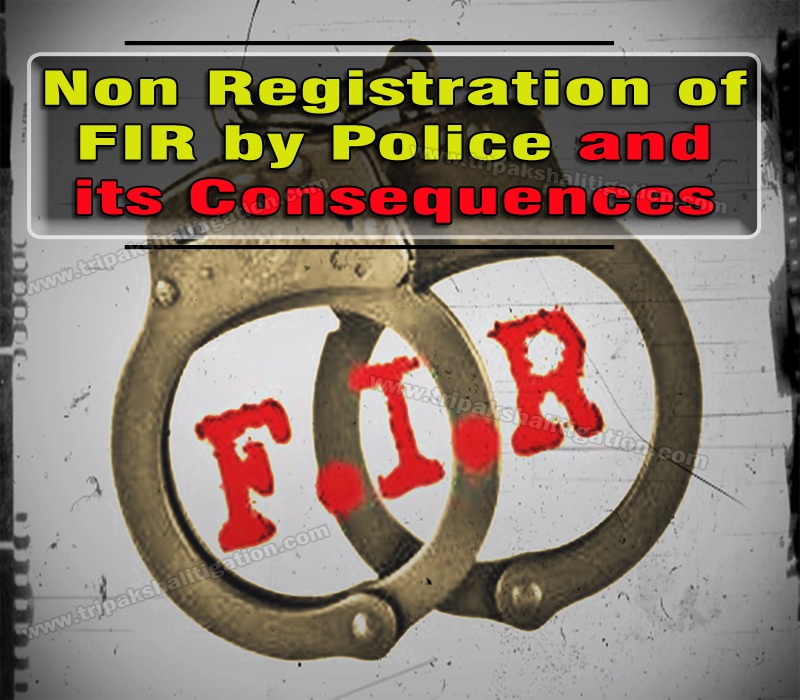Introduction
Information given under sub-section 1 of section 154 CrPC is commonly known as First Information Report (FIR).It is the earliest and the first information of a cognizable offence recorded by an officer-in-charge of a police station. It sets the criminal law in motion and marks the commencement of the investigation. Section 154 CrPC further provides that the information may be given by any person (victim, a witness or someone else with knowledge of the crime) either orally or written to an officer who is in charge of a police station and such information shall be reduced in writing by such officer and shall be signed by person giving it and kept in prescribed books.
Sub-section 2 of section 154 CrPC provides that the informant is entitled to get a copy of the First Information Report lodged by him free of cost. An accused person is also entitled to get a copy of the first information report under section 207 of CrPC which entitles the accused to get the copy of the first information report the investigation has been completed by the police in the said case, and the charge sheet has been filed in the Court. Also there have been some cases where the Court has provided the accused with the copy of the FIR even before filing of charge sheet and on his request and payment of a certain fee.
Problem of Non Registration of FIR
Sometimes police is unwilling to register a FIR whenever someone complaints about the commission of an offence. This can be both legal and illegal. In cases where they don’t have jurisdiction or is not in their legal capacity to take cognizance or the offence is of non-cognizable nature, it will be hel d legal. But where police refuses to file the complaint for unconcealed reasons, without any substantial legal ground, it is contrary to law. Most of the time it is not reported in order to reflect the peace in their area or to avoid laborious investigation.
Obligation to Register FIR
In Lalita Kumari vs. Govt. of Uttar Pradesh, the question before the Supreme Court was whether a police officer is bound to register a First Information Report (FIR) upon receiving any information relating to commission of a cognizable offence under section 154 of the Code of Criminal Procedure, 1973 or the police officer has the power to conduct a preliminary inquiry in order to test the veracity of such information before registering the same. The court affirming the mandatory registration of FIR made the following observations:
i) Registration of FIR is mandatory under section 154 of the Code, if the information discloses commission of a cognizable offence and no preliminary inquiry is permissible in such a situation.
ii) If the information received does not disclose a cognizable offence but indicates the necessity for an inquiry, a preliminary inquiry may be conducted only to ascertain whether cognizable offence is disclosed or not.
iii) If the inquiry discloses the commission of a cognizable offence, the FIR must be registered. In cases where preliminary inquiry ends in closing the complaint, a copy of the entry of such closure must be supplied to the first informant forthwith and not later than one week. It must disclose reasons in brief for closing the complaint and not proceeding further.
iv) The police officer cannot avoid his duty of registering offence if cognizable offence is disclosed. Action must be taken against erring officers who do not register the FIR if information received by him discloses a cognizable offence.
v) The scope of preliminary inquiry is not to verify the veracity or otherwise of the information received but only to ascertain whether the information reveals any cognizable offence.
vi) As to what type and in which cases preliminary inquiry is to be conducted will depend on the facts and circumstances of each case. The category of cases in which preliminary inquiry may be made are as under:
vii) Matrimonial disputes/ family disputes, b) Commercial offences, c) Medical negligence cases, d) Corruption cases and e) Cases where there is abnormal delay/laches in initiating criminal prosecution, for example, over 3 months delay in reporting the matter without satisfactorily explaining the reasons for delay.
The aforesaid are only illustrations and not exhaustive of all conditions which may warrant preliminary inquiry.
vii) While ensuring and protecting the rights of the accused and the complainant, a preliminary inquiry should be made time bound and in any case it should not exceed 7 days. The fact of such delay and the causes of it must be reflected in the General Diary entry.
viii) Since the General Diary/Station Diary/Daily Diary is the record of all information received in a police station, we direct that all information relating to cognizable offences, whether resulting in registration of FIR or leading to an inquiry, must be mandatorily and meticulously reflected in the said Diary and the decision to conduct a preliminary inquiry must also be reflected, as mentioned above.”
Consequences of Non Registration of FIR
Sub-section (c) of section 166A of the Indian Penal Code provides that whoever, being a public servant fails to record any information given to him under sub-section (1) of section 154 of the Code of Criminal Procedure, 1973 and in particular in relation to cognizable offence punishable under section 354, section 354A, section 354B, section 354C, sub-section (2) of section 354D, section 376, section 376A, section 376B, section 376C, section 376D or section 376E, section 509 shall be punished with rigorous imprisonment for a term which shall not be less than six months but which may extend to two years and shall also be liable to fine.
This provision is not only applicable for certain offences against women but it makes punishable the failure to record any information given to a public servant under Section 154(1), which relates to registration of FIRs .Thus provision is applicable to any non-registration of FIR under Section 154 of Criminal Procedure Code.
Therefore, if a police officer fails to register FIR on the basis of an information given to him under Section 154 of the Criminal Procedure Code that discloses commission of a cognizable offence, that police officer himself commits an offence under Section 166A(c) of the IPC. Such a police officer can be punished for a term which may extend to one year or with fine or with both.
Remedies
1. If the concerned officer in charge refuses to register a first information report about commission of a cognizable offence within his territorial jurisdiction under Sec. 154(3), the informant can approach the Superintendent of Police or the Commissioner of the police with a written complaint. If, upon analysis of the complaint, the S.P. of the Commissioner is satisfied that it discloses a cognizable offence, he may either investigate the case himself or direct his subordinate to register the FIR and initiate investigation in the matter.
2. If the above listed remedies go in vain, the informant is legally entitled to file a complaint to the Judicial Magistrate/ Metropolitan Magistrate u/s 156(3) read with Sec. 190 of the criminal procedure thereby praying FIR. to be registered by the police and investigation into the matter. A Writ Petition in the respective High Court may be filed for the issuance of Writ of Mandamus against the defaulting Police officers, inter alia, to register the FIR
3. A Writ Petition may be filed in respective High Court for seeking damages/compensation, if the inaction of the Police on the complaint/non-registration of FIR, has resulted in frustration/deprivation of life and liberty‖ of any person, guaranteed under Article 21 of Constitution of India.
4. Also complaint under section 166A of the Indian Penal Code against police officer who refuses to register FIR.
You may contact me for consultation or advice by visiting Contact Us









I got my FIR done in 2018 , till date the IO has not done any action against the FIR, what should I do, i hv written to my CM too, so far nothing has been done
We would be requiring few facts related to the case to provide you with the right legal advice, feel free to contact us on 7428871505.
Non action on your FIR is a serious issue, you must meet personally with SSP of your area ,simultaneously you can approach for who will ask for report from IO and also monitor your complaint
Good advice. Apart from this a person can also approach the court for filing of FIR